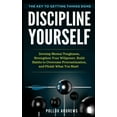How To Start Disciplining Yourself

Feeling overwhelmed by undone tasks and unmet goals? You're not alone. Self-discipline, the ability to control impulses and delay gratification, is a skill many struggle with, but experts agree it can be learned and improved upon.
This article explores actionable strategies, drawing from psychological research and expert advice, to help you cultivate greater self-discipline and achieve your desired outcomes. Think of it as a practical guide to building a stronger, more focused you.
Understanding Self-Discipline
Self-discipline isn't about rigid control or deprivation. Rather, it's about making conscious choices aligned with your long-term goals, even when faced with short-term temptations.
According to a study published in the Journal of Personality and Social Psychology, individuals with higher self-discipline tend to report greater life satisfaction and overall well-being. It's a key ingredient for success in various aspects of life, from career and finances to relationships and health.
Setting Realistic Goals
Begin by defining clear, achievable goals. Vague aspirations like "get in shape" can be daunting. Instead, try something specific and measurable, like "walk for 30 minutes, three times a week."
Break down larger goals into smaller, manageable steps. This approach makes the overall task less intimidating and provides a sense of progress along the way.
The SMART framework (Specific, Measurable, Achievable, Relevant, and Time-bound) is a useful tool for crafting effective goals.
Building a Supportive Environment
Your environment can significantly impact your ability to stay disciplined. Identify potential triggers that lead to procrastination or impulsive behaviors.
Minimize distractions by creating a dedicated workspace, turning off notifications, or using website blockers. Dr. Wendy Wood, a professor of psychology at the University of Southern California, emphasizes the power of habits in shaping behavior.
By modifying your environment, you can make it easier to form positive habits and resist negative ones.
Implementing Habit Stacking
Habit stacking involves linking a new desired behavior to an existing habit. For example, after you brush your teeth (existing habit), you could immediately meditate for five minutes (new habit).
This technique leverages the momentum of established routines to make new habits feel more natural and less forced. It's a simple yet effective way to integrate discipline into your daily life.
James Clear, author of "Atomic Habits," highlights the importance of making habits obvious, attractive, easy, and satisfying.
Practicing Mindfulness and Self-Awareness
Mindfulness, the practice of paying attention to the present moment without judgment, can enhance self-awareness. By becoming more aware of your thoughts, feelings, and urges, you can better manage your impulses.
Short meditation sessions, even just a few minutes each day, can significantly improve your ability to stay focused and disciplined. Consider using guided meditation apps or online resources.
Recognize your emotional triggers and develop coping mechanisms for dealing with stress or negative emotions without resorting to impulsive behaviors.
Rewarding Progress and Practicing Self-Compassion
Acknowledge and celebrate your achievements, no matter how small. Positive reinforcement can motivate you to stay on track and maintain momentum.
However, avoid using rewards that undermine your long-term goals. Instead of rewarding yourself with unhealthy snacks, consider activities you enjoy that support your overall well-being.
It's also crucial to practice self-compassion. Everyone makes mistakes or experiences setbacks. Don't let occasional lapses derail your progress.
Seeking Support and Accountability
Sharing your goals with a friend, family member, or mentor can provide valuable support and accountability. Having someone to check in with can increase your motivation and commitment.
Consider joining a group or community with similar goals. This can provide a sense of belonging and offer encouragement from others who understand your challenges.
Accountability partners can provide objective feedback and help you stay focused on your objectives.
The Long Game
Building self-discipline is a marathon, not a sprint. Be patient with yourself and celebrate every milestone along the way. Consistency is key.
Embrace the process of learning and growing. Don't be afraid to experiment with different strategies to find what works best for you.
By incorporating these practical tips into your daily life, you can gradually cultivate greater self-discipline and unlock your full potential.
Resources
For further exploration, consider exploring resources from the American Psychological Association and reputable self-help books on habit formation and self-control.


















